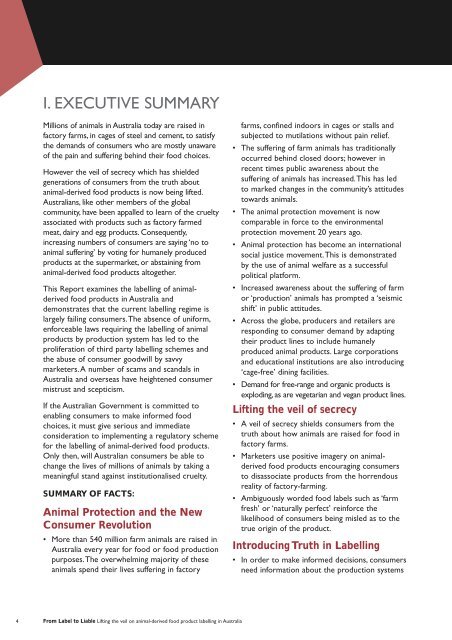From Label to Liable: Scams, Scandals and Secrecy - Voiceless
From Label to Liable: Scams, Scandals and Secrecy - Voiceless
From Label to Liable: Scams, Scandals and Secrecy - Voiceless
You also want an ePaper? Increase the reach of your titles
YUMPU automatically turns print PDFs into web optimized ePapers that Google loves.
I. E XECUTIVE SUMMARY<br />
Millions of animals in Australia <strong>to</strong>day are raised in<br />
fac<strong>to</strong>ry farms, in cages of steel <strong>and</strong> cement, <strong>to</strong> satisfy<br />
the dem<strong>and</strong>s of consumers who are mostly unaware<br />
of the pain <strong>and</strong> suffering behind their food choices.<br />
However the veil of secrecy which has shielded<br />
generations of consumers from the truth about<br />
animal-derived food products is now being lifted.<br />
Australians, like other members of the global<br />
community, have been appalled <strong>to</strong> learn of the cruelty<br />
associated with products such as fac<strong>to</strong>ry farmed<br />
meat, dairy <strong>and</strong> egg products. Consequently,<br />
increasing numbers of consumers are saying ‘no <strong>to</strong><br />
animal suffering’ by voting for humanely produced<br />
products at the supermarket, or abstaining from<br />
animal-derived food products al<strong>to</strong>gether.<br />
This Report examines the labelling of animalderived<br />
food products in Australia <strong>and</strong><br />
demonstrates that the current labelling regime is<br />
largely failing consumers. The absence of uniform,<br />
enforceable laws requiring the labelling of animal<br />
products by production system has led <strong>to</strong> the<br />
proliferation of third party labelling schemes <strong>and</strong><br />
the abuse of consumer goodwill by savvy<br />
marketers. A number of scams <strong>and</strong> sc<strong>and</strong>als in<br />
Australia <strong>and</strong> overseas have heightened consumer<br />
mistrust <strong>and</strong> scepticism.<br />
If the Australian Government is committed <strong>to</strong><br />
enabling consumers <strong>to</strong> make informed food<br />
choices, it must give serious <strong>and</strong> immediate<br />
consideration <strong>to</strong> implementing a regula<strong>to</strong>ry scheme<br />
for the labelling of animal-derived food products.<br />
Only then, will Australian consumers be able <strong>to</strong><br />
change the lives of millions of animals by taking a<br />
meaningful st<strong>and</strong> against institutionalised cruelty.<br />
SUMMARY OF FACTS:<br />
Animal Protection <strong>and</strong> the New<br />
Consumer Revolution<br />
• More than 540 million farm animals are raised in<br />
Australia every year for food or food production<br />
purposes. The overwhelming majority of these<br />
animals spend their lives suffering in fac<strong>to</strong>ry<br />
farms, confined indoors in cages or stalls <strong>and</strong><br />
subjected <strong>to</strong> mutilations without pain relief.<br />
• The suffering of farm animals has traditionally<br />
occurred behind closed doors; however in<br />
recent times public awareness about the<br />
suffering of animals has increased. This has led<br />
<strong>to</strong> marked changes in the community’s attitudes<br />
<strong>to</strong>wards animals.<br />
• The animal protection movement is now<br />
comparable in force <strong>to</strong> the environmental<br />
protection movement 20 years ago.<br />
• Animal protection has become an international<br />
social justice movement. This is demonstrated<br />
by the use of animal welfare as a successful<br />
political platform.<br />
• Increased awareness about the suffering of farm<br />
or ‘production’ animals has prompted a ‘seismic<br />
shift’ in public attitudes.<br />
• Across the globe, producers <strong>and</strong> retailers are<br />
responding <strong>to</strong> consumer dem<strong>and</strong> by adapting<br />
their product lines <strong>to</strong> include humanely<br />
produced animal products. Large corporations<br />
<strong>and</strong> educational institutions are also introducing<br />
‘cage-free’ dining facilities.<br />
• Dem<strong>and</strong> for free-range <strong>and</strong> organic products is<br />
exploding, as are vegetarian <strong>and</strong> vegan product lines.<br />
Lifting the veil of secrecy<br />
• A veil of secrecy shields consumers from the<br />
truth about how animals are raised for food in<br />
fac<strong>to</strong>ry farms.<br />
• Marketers use positive imagery on animalderived<br />
food products encouraging consumers<br />
<strong>to</strong> disassociate products from the horrendous<br />
reality of fac<strong>to</strong>ry-farming.<br />
• Ambiguously worded food labels such as ‘farm<br />
fresh’ or ‘naturally perfect’ reinforce the<br />
likelihood of consumers being misled as <strong>to</strong> the<br />
true origin of the product.<br />
Introducing Truth in <strong>Label</strong>ling<br />
• In order <strong>to</strong> make informed decisions, consumers<br />
need information about the production systems<br />
4<br />
<strong>From</strong> <strong>Label</strong> <strong>to</strong> <strong>Liable</strong> Lifting the veil on animal-derived food product labelling in Australia


